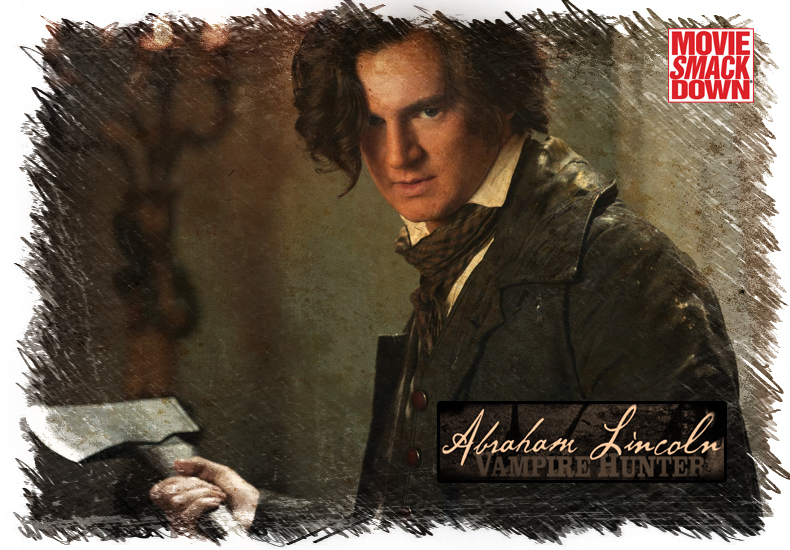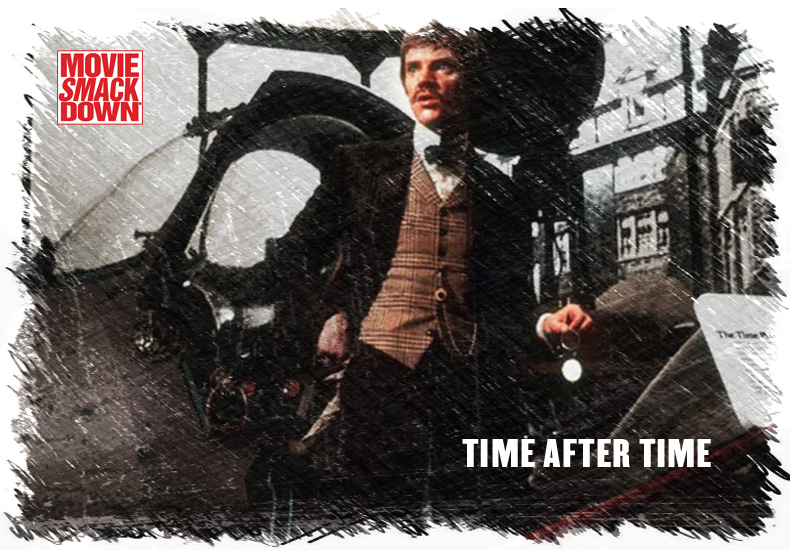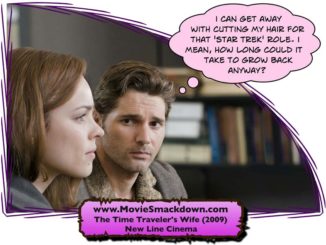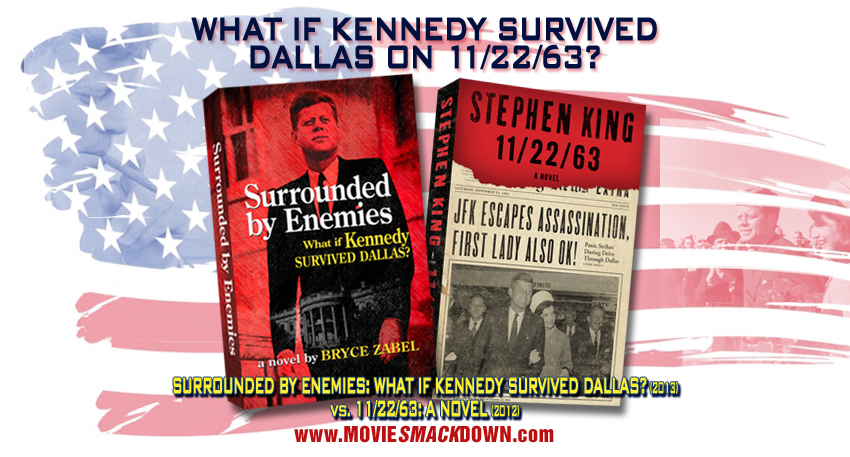
The Smackdown
Did you know that the Civil War was not merely the North fighting the South over the slavery issue, but that the Confederacy was actually an uprising of vampires, of whom Abraham Lincoln was actually a trained hunter? Or that H.G. Wells, author of The Time Machine, actually invented his very own such machine that enabled him to fight crime a century into the future? Or that George W. Bush is actually the reincarnation of a traitor beheaded by King Joffrey of the House of Lannister?
Well, okay, the first two aren’t actually true… but they bring us to this Smackdown, which is all about the fun to be had from utilizing an actual, respected historical figure as the protagonist of a goofy genre flick. Who needs turgid bio-pics when you can see Honest Abe take down a slew of fanged bloodsuckers with his silver-coated axe in the just-released Abraham Lincoln: Vampire Hunter, or H.G. Wells chase Jack the Ripper through modern San Francisco in Time After Time (1979)?
Faux-history class is now in session…
The Challenger
No, that’s not an SNL spoof trailer you’ve been seeing, nor is it even a comedy; Abraham Lincoln: Vampire Hunter is an actual, largely straight-faced summer blockbuster (in 3-D, no less) that portrays young Lincoln (stage actor Benjamin Walker, who indeed looks the part) as being singularly driven to revenge against the skeezy Jack Barts (Marton Csokas), who mysteriously killed his mother when Lincoln was just a boy. When Barts turns out to be not so easily killed, Lincoln is rescued and trained in axe expertise by Henry Sturgess (Dominic Cooper), an enigmatic combat expert with a deep-rooted understanding and hatred of vampires, which it turns out, are lurking everywhere.
From there, Lincoln’s life follows its familiar path: Courtship of Mary Todd (the lovely Mary Elizabeth Winstead), political rivalry with Stephen Douglas (Alan Tudyk), and of course, the presidency and subsequent Civil War. It also happens to involve a lot of vampire-hunting. The novel and screenplay both spring from the pen of red-hot Seth Grahame Smith who, with this and the highly anticipated Pride and Prejudice and Zombies (yes, really, it’s coming out next year) has created a lucrative niche in unlikely horror mash-ups.
Can Hamlet Meets the Wolfman be far behind?
The Defending Champion
It’s turn-of-the-century London, and Dr. John Stevenson (David Warner)is among a group visiting the home of his associate, H.G. Wells (Malcolm McDowell), a writer and science-geek who is showing off the homemade time machine he’s just invented. When the police show up, having identified Stevenson as none other than the notorious Jack the Ripper, Stevenson hops into the machine and makes a fast getaway.
The bookish, mild-mannered Wells immediately gives chase and soon finds himself alternately bedazzled and bewildered by 1979 San Francisco, where his antiquated clothes and manners are wholly incongruous but oddly endearing. He gradually picks up the Ripper’s bloody trail while also stumbling into romance with Amy (Mary Steenburgen), a sweet, independent-minded bank teller. It’s part sci-fi, part thriller, part romance, and part fish-out-of-water comedy, from the fertile mind of eclectic screenwriter Nicholas Meyer, whose credits also include the best of the original Star Trek movies (i.e, the even-numbered ones).
The Scorecard
There are really only a couple ways to make a movie entitled Abraham Lincoln: Vampire Hunter work. You either embrace its preposterous premise with giddy abandon, or you approach the historical aspect with Merchant-Ivoryish fidelity, and treat the supernatural stuff with equal sincerity. Sadly, this film chooses a middling compromise that will satisfy no one; it’s neither as ridiculous nor as serious as it should have been, resulting in essentially a fairly bland (if loud and kinetic) monster/action flick that just happens to have Abe Lincoln in its lead role.
For this, one can only blame the odd and unfortunate choice of Timur Bekmambetov, who specializes in over-the-top set-pieces, often at the expense of things like character, story, humor and even spatial coherence. In that regard, he’s sort of a Russian Michael Bay, making him a good fit for comic-book stuff like Wanted (2008), but for material this offbeat and literary, a far lighter and more subtle touch was needed. The characters are stiff, the dialogue forgettable and the period detail indifferent. Even the action sequences ultimately disappoint; the one-on-one combat scenes are too choppily edited to follow, and the big set-pieces are bogged down by bad lighting, gloomy wafts of smoke, and transparently phony CG. There’s an extended chase over a stampede of horses that, I’d be willing to bet, did not require the services of a single actual horse. And the 3-D, which has the unfortunate effect of darkening everything, results in a lot of already murky scenes being even murkier.
Time After Time, on the other hand, gets just the right treatment, with Meyer making an enormously impressive writing/directing debut. The late-70’s special effects are unlikely to wow anyone today, but on the whole, the movie has aged pretty well, and more to the point, the visuals are given far less priority than the characters and performances. Malcolm McDowell, whose bread and butter for the last five decades has been playing creepy and hateful, turns out to make an engaging and instantly likable leading man; his Wells is intelligent, gentlemanly, slightly bumbling and almost childlike in his excitement at the modern world around him. He and Steenburgen, one of the best and most adorably quirky actresses of her day, turned out to bond so well that they fell in love and eventually married in real life, and it shows in their dazzling on-screen chemistry. David Warner meanwhile demonstrates why he was one of the decade’s most reliable screen villains.
Meyer clearly loves and understands actors in ways that Bekmambetov does not; he seems to have directed his Lincoln to project “noble decency” and left it at that. The usually lively Winstead (The Thing) is equally forgettable and badly miscast as Mary, and Rufus Sewell as the main vampire does his usual sneering thing. Only Cooper, in the Mr. Miyagi role, really shines, but he disappears for long stretches and, like the rest of the cast, eventually gets lost in all the pyrotechnics.
The Decision
Ridiculously heavy hand or charmingly light touch? It’s not much of a contest here, with the not-silly-enough, overblown, CG extravaganza getting easily rope-a-doped by the low-key charmer. TKO for the clever, witty, quietly romantic and beautifully acted Time After Time, while on the Tiersky Scale, Abraham Lincoln: Vampire Hunter gets a four score out of ten.









Saw the trailer for Abe Lincoln: Vamp Hunter. Couldn’t stop laughing. Now I’m just waiting for Mother Teresa: Fairy Stabber and I can die a happy man…
Oh the humanity.
With as ridiculous as a premise as Abe Lincoln: Vampire Hunter, and as interesting of a premise as Time After Time, it’s a surprise to me that people are voting halfway for Abe Lincoln (my vote made it even and I voted for Time after Time…) Oh well, people (especially younger masculine crowds) crave annoying amounts of CGI, explosions, and action. I guess I can’t judge them for wanting a movie with a lot of stunning visual effects, but I prefer a gripping story to action sequences.
“Four score out of ten.” — Brilliant!
Loved the review…
Since he never told us about this aspect of his life, I guess we can say that “Honest Abe” was an exaggeration?
Time After Time is still one of my all-time favorites even after all this … er … Time. Too bad about Abe. I had such high hopes.